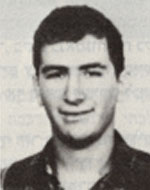Shazar, Ron (Roni)
Ron (Roni), son of Asya and Shimon, was born on July 6, 1952 in Haifa. He studied at the Haya Ziv Elementary School in Haifa and completed his studies at the naval officers’ school in Acre. Roni excelled in his studies as a diligent, self-confident student who aspired to expand his knowledge and to deepen his understanding of what he had learned in every field. By nature, he was stubborn and could fight to achieve his goals and effectively carry out any task he took upon himself. He was always involved in everything that took place around him, was interested in politics and social problems and had very strong views on these issues. He liked to argue about anything in the world, even for argument. Although the boarding school was difficult and time-consuming, he found time to guide students in the lower grades and helped them with their studies with dedication and tirelessness. Even after they parted ways, he maintained contact with them and followed their progress. Roni was a guide in the “Mahanei Haolim” movement and was considered an excellent guide who did not impose his views on his students and never asked them for anything he did not demand of himself. He could impart to them his great love for the Land of Israel, and to travel with them on trips and trips around the country, to show them the beauty of their landscapes and to teach them chapters in the history and heritage of their people. Roni has a sensitive and poetic soul, read many Yaffa books and used to write, and his estate contains lists and poems full of beauty and pain. When he came to serve in the army he wanted to serve in a way that would combine his aspirations for values of morality and equality with the army, and he decided to join the Nahal Brigade, where he hoped to provide his love for the sea. He was a good soldier, was genuinely interested in everything he learned and did everything he was willing and dedicated to. He also excelled in his role as a Nahal soldier and when he came to the agriculture, he enlisted vigorously to do his own work. To correct distortions, instead of expecting others to do the job. He was very critical of things he considered to be of moral and aesthetic value, but as usual he did not stop talking, but offered solutions and did things in practice. When the Yom Kippur War broke out, Roni was with his unit in the “village” stronghold on the banks of the Suez Canal, and together with his comrades he fought valiantly to stop the Egyptian attacks. On the 8th of Tishrei 5734 (October 8, 1973), he was killed and killed. He was brought to eternal rest in the cemetery at Kibbutz Eilot. He was survived by a mother and two sisters. After his fall, he was promoted to the rank of corporal and awarded the “Medal of Honor” to testify that he had shown courage to be a model. This description of the act: “With the outbreak of the fighting, columnist Ron Shazar served in the” village “stronghold on the banks of the Suez Canal. While he was still shooting at the MAG in the enemy, he was severely burned in the hands, but continued to fire despite the injury, and when he needed to bring oil to the kitchen he volunteered for it, even though the area was under enemy fire. In an Egyptian tank, shooting from the West Bank, which forced him to expose his body to the fire of the enemy and thus fought until he was killed. His mother published a booklet in his memory, in which members and commanders spoke of his character.
